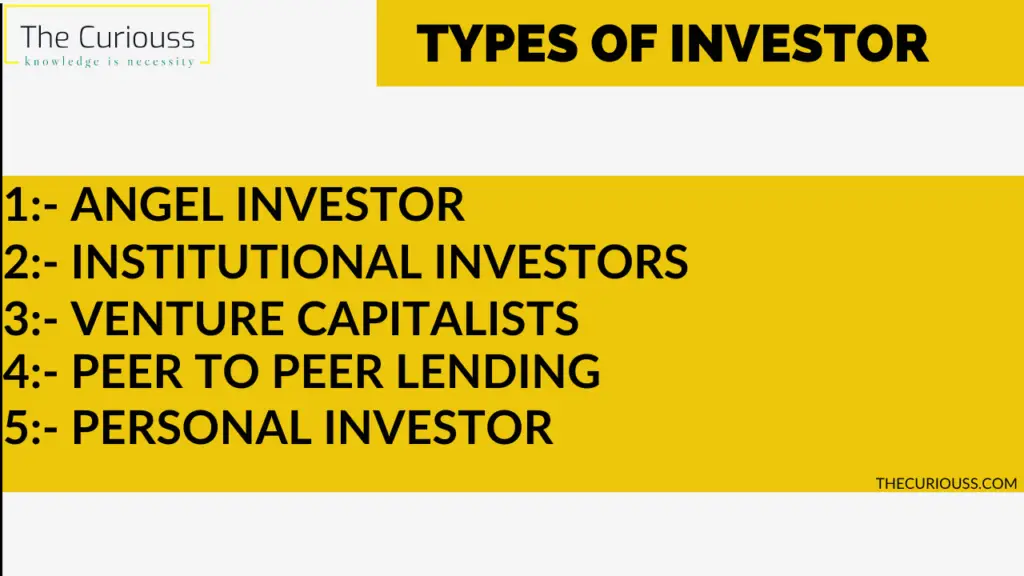In this blog we will learn the what are the 5 types of Investor and how they choose a startup to invest their capital to create wealth. firstly we have to understand that what exactly is investor and then 5 types of investor.
Who is Investor ?
An investor is either an individual, a business, or a financial entity who allocate their financial capital in a specific commodity, currency, or organisation in the hopes of reaping some financial returns in the future. A company, or even a mutual fund, can be recognised an investor.
Anyone who willingly uses their own capital to finance a business, market endeavour, or commodity is betting on the possibility that the commodity’s or endeavor’s inherent value will rise over time in the market and provide the investor with financial returns when he returns his share of capital.
There are multiple kinds of investors who focus on one financial stream and invest the majority of their capital in it. We will discuss the different types of investors and what they invest in, but first, we would like to clarify that a trader and an investor are not the same thing. A trader seeks high-risk, short-term investment opportunities that yield higher profits at higher risk, whereas an investor seeks low-risk, long-term investment opportunities that yield returns over time.
What are the Types of Investors?

1:- Angel Investor
An angel investor is a wealthy individual who provides financial support to a new startup or entrepreneur. The capital is provided primarily in exchange for a stake in the company. Angel investors can make a one-time or ongoing financial contribution. In the early stages of a new business, when risk is too high, an angel investor typically provides capital. They quite often allocate excess cash to high-risk investments.
2:- Institutional Investors
Institutional investors are companies that invest other people’s money. Mutual funds, pension funds, exchange-traded funds and hedge funds are examples of institutional investors. Even though institutional investors raise large amounts of capital from a large number of investors, they can buy large amounts of assets, typically large blocks of stocks. Institutional investors can influence asset prices in a variety of ways. Institutional investors are large and skilled to invest.
3:- Venture Capitalists
Venture capitalists are private equity investors who make investments in startups and other small businesses. They usually take the some stake of a company. Unlike angel investors, they don’t really seek to fund businesses in their early stages in order to help them get started, but instead look at businesses that are already in their early stages and have the potential for growth. These are businesses that want to grow but lack the resources to do so. In exchange for their investment, venture capitalists seek an equity stake in the company, which they then sell for a profit.
4:- Peer To peer Lending
Peer-to-peer lending is a type of financing in which loans are obtained from other people, skipping the traditional middleman, such as a bank. These lenders specialize in this type of investing, and if a company wants their financial assistance, they must approach them on their own. These lenders personally fund the ventures of small businesses and purchase their shares if they like the business idea and believe it has potential.
5:- Personal Investor
Personal investor is any individual who invests on their own risk appetite. A personal investor is someone who invests their own money, typically in equities, bonds, mutual funds, and exchange-traded funds (ETFs). Personal investors are individuals who seek higher returns than simple alternative investments such as certificates of deposit or savings accounts.
Investor Role In Business or Startup?
The role of an investor can be different depending on the specific investment and the needs and requirement of the company or start-up. In general, however, investors can play a number of roles in a business; some of them is listed below.
- Providing capital: this is the first and most important role of investors; they provide financial backing to companies, often in exchange for equity or ownership stake in the company and this is what they are known for.
- Offering mentorship: Many angel investors have experienced success in business and can offer valuable guidance and mentorship to the management team of the company they are investing in. this also help new start-up to get optimistic view and ladder to work best on their business.
- Connecting the company to their network: investors often have a wide network of contacts and resources that they can introduce to the company they are investing in. This can be especially helpful for startups that are looking to expand their reach and build partnerships. Business network provide new start-up an advantage to be more stable in their business.
- Influencing business decisions: Investors may have a say in the strategic direction of the company and can help to shape and organised its business decisions. It can be positive or negative for business.
- Providing strategic advice: Angel investors may offer insights and advice on business strategy and decision-making to help the company achieve its goals and be more successful.
- Serving as a sounding board: Angel investors can provide a valuable outside perspective and can act as a sounding board for the management team as they navigate the challenges of growing a business and start-ups.
- Monitoring performance: Investors may be involved in monitoring the financial performance of the company and providing feedback and suggestions to the management team.
An investor is an essential component of the business world
